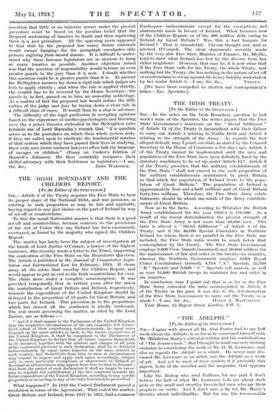THE IRISH BOUNDARY AND THE CHILDERS REPORT. [To We Editor
of the SPECTATOR.] SIR,—Article 5 of the Treaty requires the Free State to bear
its proper share of the National Debt, and war pensions, as existing in such proportion as may be fair and equitable, having regard to any just claims on the part of Ireland by way of set-off or counterclaim.
To this the usual Nationalist answer is that there is a good set-off and counterclaim, because contrary to the provisions
Of the Act of Union they Say Ireland has been enormously Overtaxed, as found by the majority who signed the Childers Report.
The matter has lately been the subject of investigation at
the hands of Lord Justice O'Connor, a lawyer of the highest eminence, who recently wrote a letter to the Times, supporting the contention of the Free State on the Boundaries Question. The Article is published in the Journal of Comparative Legis- lation and International Law for February, 1924. It clears
away all the mists that envelop the Childers Report, and would appear to put an end to the Irish counterclaim for ever.
The claim arose under a complete misconception. It was provided temporarily that in certain years after the union the contribution of Great Britain and Ireland, respectively, towards the expenditure of the United Kingdom should be defrayed in the proportion of 15 parts for Great Britain, and two parts for Ireland. This provision as to the proportions which has caused all the confusion is wholly irrelevant.
The real words governing the matter, as cited by the Lord Justice, are as follows
And if it shall appear to the Parliament of the United Kingdom that the respective circumstances of the two countries will thence- forth admit of their contributing indiscriminately, by equal taxes imposed on the same articles in each, to the future expenditure of the United Kingdom, it shall be competent to the Parliament of the United Kingdom to declare that all future expense thenceforth to be incurred, together with the interest and charges of all joint debts contracted previous to such declaration, shall be so defrayed indiscriminately by equal taxes imposed on the same articles in each country, and thenceforth from time to time as circumstances may require to impose and apply such taxes accordingly, subject only to such particular exemptions or abatements in Ireland or Scotland as circumstances may appear from time to time to demand ; that from the period of such declaration it shall no longer be neces- sary to regulate the contribution of the two countries towards the future.expenditure of the United Kingdom, according to any specific proportion or according to any of the rules hereinbefore prescribed."
What happened ? In 1816 the United Parliament passed a resolution in terms of the Agreement. That ended the matter. dreat Britain and Ireland, from 1817 to 1921, had a common
Exchequer—indiscriminate except for the exemptions and abatements made in favour of Ireland. What becomes now of the Childers Report, or of the 300 million debt owing to Ireland by Great Britain ? Was this a bad bargain for Ireland ? That is inunaterial. Cavour thought not, and so advised O'Connell. The clear statements recently made by the very able Free State Minister of Finance, Mr. Blythe, tend to show what Ireland has lost by the divorce from her richer neighbour. However, that may be, it is now clear that if the Free State calls for the Treaty, the whole Treaty, and nothing but the Treaty, she has nothing in the nature of set-off or counterclaim to set up against the heavy liability undertaken
by her under Article am, Sir, &c., VINDEX. [We have been compelled to shorten our correspondent's letter.—En. Spectator.]










































 Previous page
Previous page